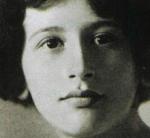Disable ads!
Simone Weil
Simone Weil (/veɪ/; French: [simɔn vɛj]; 3 February 1909 – 24 August 1943) was a French philosopher, Christian mystic, and political activist. Weil's life was marked by an exceptional compassion for the suffering of others; at the age of six, for instance, she refused to eat sugar after she heard that soldiers fighting in World War I had to go without. She died from tuberculosis during World War II, possibly exacerbated by malnutrition after refusing to eat more than the minimal rations that she believed were available to soldiers at the time. After her graduation from formal education, Weil became a teacher. She taught intermittently throughout the 1930s, taking several breaks due to poor health and to devote herself to political activism, work that would see her assisting in the trade union movement, taking the side of the Anarchists known as the Durruti Column in the Spanish Civil War, and spending more than a year working as a labourer, mostly in auto factories, so she could better understand the working class. Taking a path that was unusual among twentieth-century left-leaning intellectuals, she became more religious and inclined towards mysticism as her life progressed. Weil wrote throughout her life, though most of her writings did not attract much attention until after her death. In the 1950s and 1960s, her work became famous on continental Europe and throughout the English-speaking world. Her thought has continued to be the subject of extensive scholarship across a wide range of fields. A meta study from the University of Calgary found that between 1995 and 2012 over 2,500 new scholarly works had been published about her. Although sometimes described as odd, humourless, and irritating, she inspired great affection in many of those who knew her. Albert Camus described her as "the only great spirit of our times".
 Read more on wikipedia.org Read more on wikipedia.org
 All quotes by Simone Weil All quotes by Simone Weil
 Edit Edit
|

|
|
|
|
|
Background photo by Giuliana
|